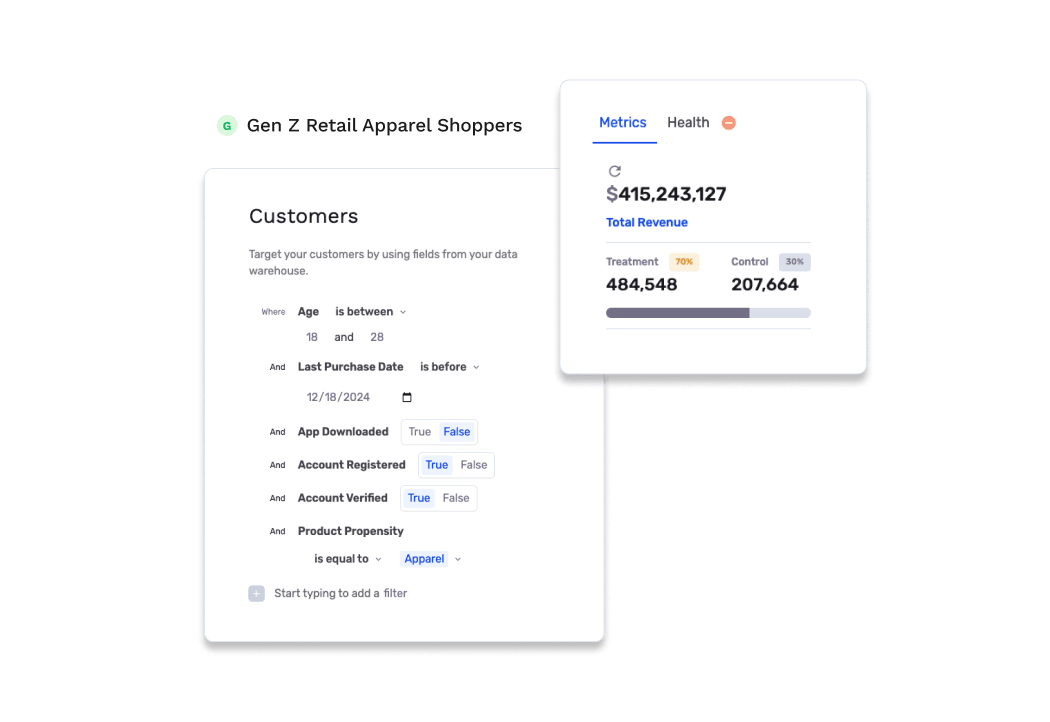Why is audience segmentation important?
Audience segmentation represents a strategic approach to marketing. It turns broad customer bases into targeted, actionable groups. Instead of creating generic messaging to everyone, segmentation lets marketers deliver relevant messaging that resonate with specific audience subsets.
Enhanced marketing focus and effectiveness
Audience segmentation matters because it turns marketing from a broad, unfocused approach to highly targeted communications.
This approach is often better than using broad content that is aimed at “everyone," as businesses tend to generate 10%-15% more revenue with it. Audience segmentation involves:
Empowering marketers to define clear target audiences with specific characteristics
Developing tailored messaging that addresses segment-specific interests
Creating more focused campaigns and customer journeys that achieve higher engagement rates
Delivering the right content to the right audiences at precisely the right times
Digital advertising platforms using audience segmentation typically achieve higher click-through rates than non-segmented campaigns. For example, marketing teams implementing behavioral segmentation in their display advertising might see better conversion rates compared to general audience targeting.
Improved customer loyalty and experience
Well-executed segmentation significantly enhances the customer experience by making interactions more relevant and meaningful:
Customers receive content and offers that matter to them
Personalization demonstrates that brands understand their specific needs
Relevant communications build stronger emotional connections with brands
Personalized experiences increase customer satisfaction and loyalty
For example, a coffee shop rewards program uses transaction history to segment customers based on purchasing behavior and preferences.
The mobile app tracks favorite drinks, visit frequency, and spending patterns to deliver personalized offers. For frequent morning visitors who typically order espresso drinks, they might send an early promotion for a new espresso-based beverage, while occasional weekend visitors who prefer cold drinks receive different promotions for iced beverages.
Improved conversion rates and ROI
Perhaps the most compelling business case for audience segmentation is its direct impact on conversion rates and ROI.
Personalized offers based on segment characteristics convert at higher rates
Focused messaging reduces wasted ad spend on uninterested audiences
More efficient resource allocation improves overall marketing ROI
Segmented email campaigns typically achieve significantly higher open rates, click-through rates, and lower unsubscribe rates. For e-commerce marketers in particular, segmented campaigns targeting product interest groups or purchase history cohorts often generate substantial revenue increases compared to non-segmented campaigns.
Better product development and pricing strategies
Audience segmentation provides invaluable insights that extend beyond marketing to influence product development and pricing:
Identifying specific needs within segments can inspire new product features
Understanding segment demographics helps determine appropriate price points
Recognizing emerging segments can uncover new market opportunities
Segment-specific feedback can guide product improvements
For example, software companies can use audience segmentation to inform their pricing and product strategies. After analyzing their customer base, they can identify distinct segments ranging from casual users to enterprise professionals.
Instead of offering one-size-fits-all expensive software packages, they launch tiered subscription options tailored to each segment's needs and price sensitivity. They create different plans for hobbyists, specialists who need only one audience segmentation tool, and professionals requiring the full suite.

